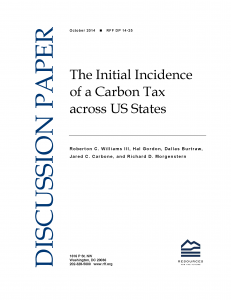Resources Magazine: EPA’s Clean Power Plan: Breaking Down the Building Blocks
In June, the US Environmental Protection Agency (EPA) announced a proposed rule for reducing carbon dioxide emissions from existing power plants. Using its authority under the Clean Air Act, EPA set state-specific targets for emissions rates reductions (Figure 1). However, many questioned how this proposed plan would impact actual emissions from the electricity sector and […]
Resources Magazine: What Americans Think About Climate Change
By Jon A. Krosnick, Nuri Kim, and Bo MacInnis. Polling Americans about climate change reveals a largely united desire for government action—and other surprises. On many issues, public opinion is so evenly divided that it does not provide a clear signal to government—but that’s not true on the issue of climate change. During the past […]
A Look at How the NFIP Differs from a Private Insurance Company
Flood insurance in the United States is offered through the federal National Flood Insurance Program (NFIP). The 2005 hurricane season sent the program massively into debt to the US Treasury. As the deficit grew, Congress focused its attention on the program’s pricing policies. One focus was on the roughly 20 percent of policyholders who pay […]
Crediting Early Action under EPA’s Clean Power Plan
This is the seventh in a series of questions that highlights RFF’s Expert Forum on EPA’s Clean Power Plan. Readers are invited to submit their own comments to the questions and/or the responses using the “Leave a Comment” box below. See all of the questions to date here. RFF asks the experts: Should EPA credit early action […]
Cap and Trade in China: How Might It Work?
China plans to start a nationwide cap-and-trade market in 2016. But can China, whose economy still contains many nonmarket features, properly design and implement a fundamentally market-based policy? In our new RFF discussion paper, my coauthors (RFF’s Richard Morgenstern, Zhongmin Wang, and Xu Liu) and I attempt to answer this question by examining cap-and-trade pilot […]
Looking at the Effects of a Carbon Tax across States

The use of revenue from a carbon tax or cap-and-trade program substantially affects who gains and who loses as a result of the policy; indeed, it is often more important than the effect of the carbon tax itself. In a previous RFF discussion paper, we (together with RFF’s Dallas Burtraw and Richard Morgenstern, and Jared […]
Designing Cost-Efficient Surveillance to Control Invasive Species
Invasive species can cause substantial reductions in a region’s ecological, industrial, and human welfare, and often require significant control expenditures. The Emerald Ash Borer, for example, established itself in the United States in the early 1990s and has caused the death of hundreds of millions of ash trees and is estimated to cause billions of […]
Improving the Efficiency of Coal Plants under EPA’S Clean Power Plan
This is the sixth in a series of questions that highlights RFF’s Expert Forum on EPA’s Clean Power Plan. Readers are invited to submit their own comments to the questions and/or the responses using the “Leave a Comment” box below. See all of the questions to date here. RFF asks the experts: how can coal power plants […]
The Role of Renewable Energy in EPA’s Clean Power Plan
This is the fifth in a series of questions that highlights RFF’s Expert Forum on EPA’s Clean Power Plan. Readers are invited to submit their own comments to the questions and/or the responses using the “Leave a Comment” box below. See all of the questions to date here. RFF asks the experts: Does EPA make appropriate assumptions […]
Is There Really Bipartisan Consensus on Benefit-Cost Analysis of Regulation?
Beyond obvious rhetoric, are there discernible differences among the ways that Democrats and Republicans tackle economic analyses of federal regulations? Yes—and no, according to our content analysis of all the Office of Management and Budget’s (OMB) annual Reports to Congress on the Benefits and Costs of Federal Regulations (or, for our purposes here, Reports) issued […]

 Subscribe; to our RSS Feed
Subscribe; to our RSS Feed Tweets by @RFF_org
Tweets by @RFF_org 
Recent Comments